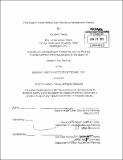Challenges in implementing green workforce development training
Author(s)
Yeung, Louise H. (Louise Ho-Yee)
DownloadFull printable version (4.270Mb)
Other Contributors
Massachusetts Institute of Technology. Department of Urban Studies and Planning.
Advisor
Judith A. Layzer.
Terms of use
Metadata
Show full item recordAbstract
To meet the labor demands of green economic development, workforce development programs are increasingly training low-income workers for living wage jobs that contribute to environmental services or benefits. Yet, effectively preparing workers for jobs in emergent green economies, which can span many different sectors from energy efficiency to waste management, presents significant challenges for job training programs in practice. This thesis investigates the difficulties of adding a green dimension to job training while still meeting the basic employment objectives of workforce development programs. Through the experiences of the Oakland Green Jobs Corps and the Baltimore Center for Green Careers (BCGC), I analyze the mechanisms through which each program has influenced labor supply and demand to enable jobs in the green economy. Ultimately, the two cases highlight the tradeoffs between achieving green objectives and securing employment for disadvantaged workers at scale. In shedding light on how and why different programmatic decisions have influenced performance outcomes, this thesis aims to inform other cities' decisions in developing green jobs training initiatives.
Description
Thesis (M.C.P.)--Massachusetts Institute of Technology, Dept. of Urban Studies and Planning, 2013. Cataloged from PDF version of thesis. Includes bibliographical references (p. 44-47).
Date issued
2013Department
Massachusetts Institute of Technology. Department of Urban Studies and PlanningPublisher
Massachusetts Institute of Technology
Keywords
Urban Studies and Planning.